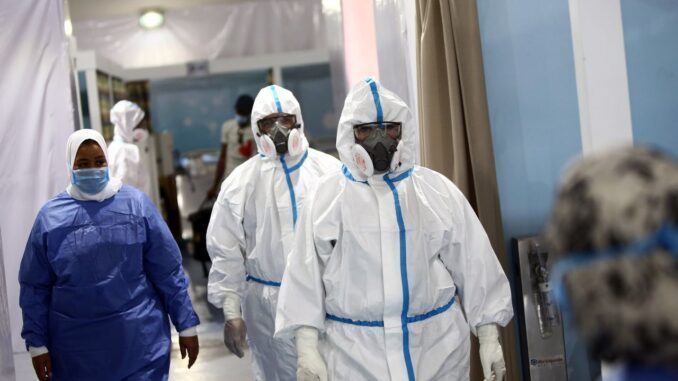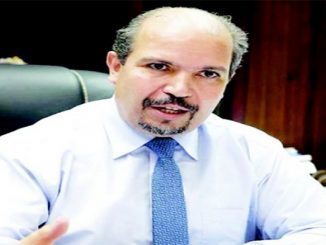
The government has banned wedding and funeral gatherings in bid to stem rapid rise in infection and deaths Rapidly rising Covid-19 infections are setting off alarm bells in Egypt, leading to a new raft of government restrictions and renewing fears the country’s healthcare system could be pushed to the brink of collapse.
Covid-19 infections and deaths have reached new heights in the Arab world’s most populous state, amid warnings from health officials that the true figure of fatalities may be far higher than reported.
The urgency of the unfolding crisis has prompted Egyptian authorities to cancel New Year celebrations and ban wedding gatherings and funeral ceremonies.
The Ministry of Health reported 1,411 infections on 30 December, the highest for a single day in five months, bringing overall infections to 139,471 since the pandemic hit in February 2020.
Fifty-six deaths were reported by health authorities that day, the highest daily total since August. With more than 7,600 deaths from Covid-19, Egypt has the second-highest death rate in Africa.
Egypt’s figures have puzzled experts, who say the mortality rate of around 5 percent of recorded cases of Covid-19 far exceeds that of countries with comparable demographics, and total infection numbers are likely well above the official figures (Egypt’s 140,000 recorded infections in a population of 100 million compares to Iraq’s near 600,000, Iran’s 1.2 million, Israel’s 438,000 and Saudi Arabia’s 363,000).
In recent weeks officials have said, not for the first time, the true figures for cases may actually be far higher than reported.
Rick Brennan, director of the World Health Organization’s Health Emergencies Program for the Eastern Mediterranean, doubted the official count, telling a webinar on 9 December that the government had focused its testing to a small subset of citizens, especially those with severe symptoms.
Those with mild or moderate symptoms were not undergoing the standard polymerase chain reaction (PCR) tests, Brennan said.
“We see that the official numbers in Egypt are more of estimations and do not represent the real number of coronavirus patients, but we [WHO] do not rely on the daily reports only; we also look into other indicators like fatalities, ICU occupancy rate and hospital capabilities,” he said
On 21 December, a member of the scientific committee of the Ministry of Health and Population estimated real infections to be 10 times higher than official figures.
“We have more coronavirus infections than what is announced,” Mohamed al-Nady said. “They are at least ten times higher.”
Egyptian authorities have tried to clamp down on those questioning its response or the official figures, including six doctors and pharmacists who were imprisoned on charges of “spreading false news” after raising concerns over the lack of protective equipment for healthcare workers.
In March, Egypt forced Guardian journalist Ruth Michaelson to leave the country for reporting on a scientific study that said Egypt was likely to have more coronavirus cases than officially confirmed.
The Ministry of Health has specified 360 hospitals nationwide to deal with Covid-19 infections, while the Ministry of Higher Education has put aside an even larger number of teaching hospitals for virus-infected people.
But doctors say this falls way short of the numbers required to deal with a stampede of new patients, meaning only a fraction of those infected can be treated.
“The hospitals are receiving more people every day, which is why they are running out of space,” leading pulmonologist Hesham Abul Nasr told Middle East Eye. “But this opens the door for more deaths.”
Rasha Ahmed, a housewife in her early 30s who recently tested positive for Covid-19, said an East Cairo hospital sent her home because beds were reserved for severe cases only.
“It is not easy to secure a hospital bed,” she told MEE. “There are too many patients at the hospitals.”
Meanwhile, private hospitals are thriving, capitalizing on the rising demand to charge steep prices. Still, even the relatively affluent can ill afford them.
In a high-profile case that highlights the differing challenges Egyptians face, Fouad Farag, a professor at Cairo University, and his dying wife were reportedly turned away from a state-run hospital in late December.
The couple then turned to a private hospital but left after they were unable to afford its increased costs. The professor’s wife was later admitted to a public hospital, only after the minister of higher education personally intervened.
But for those without money or high-level connections, bed shortages can mean returning to see out the illness or even die in cramped living quarters, where the contagion can freely spread.
Deaths at home or in private hospitals are not recorded in official figures, which only account for state-run hospitals.
Still, the enormity of the tragedy is hard to conceal.
The official statistics organization, Central Agency for Public Mobilization and Statistics, recently reported 60,000 deaths from May through July 2020, the peak months of the first wave of Covid-19 in Egypt.
This is a far higher than the average death rate in the corresponding months in previous years.
“Deaths are rising because of the lack of abidance by ordinary people to preventive measures,” Nagwa al-Shafie, a member of the board of the Medical Association, the independent union of the nation’s medical doctors, said, “Decreasing temperatures are also contributing to a wider virus spread,” reported MEE.
Mounting anger has also been directed towards Egypt’s government for delaying the roll-out of a much-touted immunization program.
The government had announced that the immunization program would start with frontline health workers and then senior citizens before the end of 2020.
That Egypt opted to purchase 100,000 doses of the Chinese Cinopharm vaccine, rarely used in other countries, has also been a cause for criticism.
But the delay is down to safety concerns and not incompetence, Shafie said.
“I believe the authorities are taking time to ensure that the vaccine shots that have arrived are safe to use,” she said. “I hope the immunization process will start soon.”
Decision-makers in Cairo are now locked in a race against time to stem the spread of the virus, rushing through a flurry of measures over the new year.
On Thursday, Egypt’s Abdel Fattah al-Sisi postponed first-term exams for school pupils and university students after several infections and deaths were reported at the nation’s educational institutions and under pressure from panicking parents.
Commenting on the decision, Minister of Education Tarek Shawqi said the decision aimed at keeping the lid on infections during the Covid-19 peak months of January and February.
Wearing masks will become mandatory from Saturday, with stiff fines for those who fail to do so at work or on public transport.
Authorities say there may be more restrictions if cases continue to escalate.
“The government has taken strict measures to prevent the infections from growing,” Shadia Thabet, a member of the committee on health in the Egyptian parliament, told MEE. “I think we need to move to the next level, namely by imposing more closures, if these measures do not pay off.”



